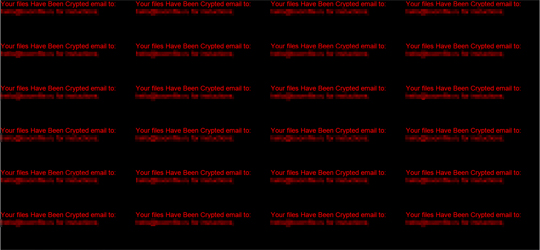RANSOM_CRYPTWELVE.B
Ransom.CryptXXX (NORTON), TR/RedCap.khogd (ANTIVIR), Ransom:MSIL/Natiris.A (MICROSOFT)
Windows


Threat Type: Ransomware
Destructiveness: No
Encrypted: No
In the wild: Yes
OVERVIEW
This Ransomware arrives on a system as a file dropped by other malware or as a file downloaded unknowingly by users when visiting malicious sites.
It drops files as ransom note.
TECHNICAL DETAILS
Arrival Details
This Ransomware arrives on a system as a file dropped by other malware or as a file downloaded unknowingly by users when visiting malicious sites.
Installation
This Ransomware drops the following files:
- %User Temp%\wallpaper.bmp
- %Desktop%\sys.bat <-used to terminate the ransomware
(Note: %User Temp% is the user's temporary folder, where it usually is C:\Documents and Settings\{user name}\Local Settings\Temp on Windows 2000, Windows Server 2003, and Windows XP (32- and 64-bit); C:\Users\{user name}\AppData\Local\Temp on Windows Vista (32- and 64-bit), Windows 7 (32- and 64-bit), Windows 8 (32- and 64-bit), Windows 8.1 (32- and 64-bit), Windows Server 2008, and Windows Server 2012.. %Desktop% is the desktop folder, where it usually is C:\Documents and Settings\{user name}\Desktop in Windows 2000, Windows Server 2003, and Windows XP (32- and 64-bit); C:\Users\{user name}\Desktop in Windows Vista (32- and 64-bit), Windows 7 (32- and 64-bit), Windows 8 (32- and 64-bit), Windows 8.1 (32- and 64-bit), Windows Server 2008, and Windows Server 2012.)
It adds the following mutexes to ensure that only one of its copies runs at any one time:
- KristinaCS
Other System Modifications
This Ransomware adds the following registry keys:
HKEY_CURRENT_USER\Control Panel\Desktop
Wallpaper = %User Temp%\wallpaper.bmp
It sets the system's desktop wallpaper to the following image:
Other Details
This Ransomware does the following:
- Can perform encryption routine on all different directories found at the same time
- Exits and deletes itself only after performing all the encryption routines
- Execute the following commands usind CMD
/C net view
Ransomware Routine
This Ransomware avoids encrypting files with the following strings in their file name:
- .crypt12
- .tmp
- .sep
- .tlb
- .tbl
- .tsp
- .cmd
- .ax
- .olb
- .com
- .acm
- .edb
- .ini
- .exe
- .386
- .73u
- .8xu
- .adm
- .adml
- .admx
- .ani
- .ann
- .aos
- .asec
- .bio
- .bk2
- .blf
- .bmk
- .bud
- .cab
- .cdmp
- .chs
- .ci
- .cnt
- .cpi
- .cpl
- .cpq
- .cur
- .desklink
- .deskthemepack
- .dev
- .diagcab
- .diagcfg
- .diagpkg
- .dimax
- .dit
- .drv
- .dss
- .dyc
- .ebd
- .efi
- .evtx
- .ffa
- .ffl
- .ffo
- .ffx
- .ftg
- .fts
- .gmmp
- .grl
- .group
- .grp
- .h1s
- .hdmp
- .hhc
- .hhk
- .hiv
- .hlp
- .hpj
- .hsh
- .htt
- .icl
- .icns
- .ico
- .idi
- .ifw
- .ime
- .img3
- .inf_loc
- .ins
- .ion
- .ipod
- .itemdata-ms
- .its
- .jpn
- .kbd
- .key
- .kor
- .library-ms
- .lnk
- .log1
- .log2
- .lpd
- .manifest
- .mapimail
- .mdmp
- .mi4
- .mlc
- .mobileconfig
- .msc
- .msp
- .msstyle
- .msstyles
- .mui
- .mui_cccd5ae0
- .mum
- .mydocs
- .nb0
- .nbh
- .nfo
- .nls
- .nt
- .ntfs
- .p7b
- .pck
- .pdr
- .pfx
- .pid
- .pk2
- .pol
- .ppd
- .prefpane
- .prf
- .printerexport
- .ps2
- .pwl
- .rc1
- .rc2
- .rco
- .reg
- .regtrans-ms
- .rfw
- .rmt
- .rs
- .ruf
- .savedsearch
- .sbn
- .scap
- .scf
- .scr
- .shd
- .shsh
- .swp
- .sys
- .tdz
- .tha
- .theme
- .trx_dll
- .uce
- .vga
- .vgd
- .vx_
- .vxd
- .webpnp
- .wer
- .wph
- .wpx
- .xfb
- .xrm-ms
- .dat
- .db
- .dll
- .dmp
- .ics
- .mod
- .mpa
- .msu
- .nomedia
- .ocx
- .ps1
- .rom
- .rtp
- .shs
- .spl
- .themepack
- .0
- .000
- .amlv
- .automaticdestinations-ms
- .bashrc
- .bash_history
- .bash_profile
- .bin
- .bk1
- .bom
- .c32
- .cat
- .cgz
- .chg
- .chk
- .cht
- .clb
- .cpr
- .crash
- .dlx
- .dvd
- .edj
- .elf
- .emerald
- .etl
- .evt
- .fid
- .fpbf
- .help
- .idx
- .ius
- .job
- .lfs
- .lockfile
- .lst
- .mbr
- .mem
- .metadata_never_index
- .panic
- .pat
- .pit
- .pnf
- .ppm
- .profile
- .prt
- .qvm
- .saver
- .sbf
- .schemas
- .sdb
- .searchconnector-ms
- .sfcache
- .so.0
- .sqm
- .str
- .wdf
- .wdgt
- .wgz
- .zone.identifier
It avoids encrypting files found in the following folders:
- D:\owncloud
- D:\gdrive
It appends the following extension to the file name of the encrypted files:
- ={Random 5 Digit Number}=hello@boomfile.ru.crypt12
It drops the following file(s) as ransom note:
- {Folder Path of Encrypted Files}\!!!!readme!!!.txt

SOLUTION
Step 1
Before doing any scans, Windows XP, Windows Vista, and Windows 7 users must disable System Restore to allow full scanning of their computers.
Step 2
Note that not all files, folders, and registry keys and entries are installed on your computer during this malware's/spyware's/grayware's execution. This may be due to incomplete installation or other operating system conditions. If you do not find the same files/folders/registry information, please proceed to the next step.
Step 3
Reset your Desktop properties
Step 4
Search and delete these files
- %User Temp%\wallpaper.bmp
- {Folder Path of Encrypted Files}\!!!!readme!!!.txt
Step 5
Scan your computer with your Trend Micro product to delete files detected as RANSOM_CRYPTWELVE.B. If the detected files have already been cleaned, deleted, or quarantined by your Trend Micro product, no further step is required. You may opt to simply delete the quarantined files. Please check the following Trend Micro Support pages for more information:
Step 6
Restore encrypted files from backup.
Did this description help? Tell us how we did.



